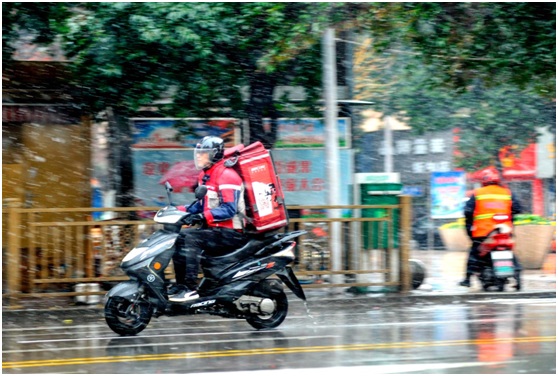By Ye Zi, People’s Daily Overseas Edition
Multiple industries have been forced into suspension by the outbreak of COVID-19, but couriers across China are still busy running on streets and in between buildings, satisfying the demand of millions. They have made a huge contribution to maintaining urban functions and lowering the incidence of infection.
“They sorted, scanned and packed hundreds of suitcases in just over half an hour, and we were so touched by them who spared no effort to help us carry the luggage.” Before leaving the epicenter Hubei, the second batch of medical staff assisting the province from Shunde Hospital of Southern Medical University expressed their appreciation to the couriers who offered free transportation service in a thank-you letter to Guo Jiajun, executive of JD Logistics’ office in Jinqiao, Wuhan on March 21.
Since March 13, JD Logistics has launched free transportation service for medics who are expected to return home after completing tasks in Hubei, melting the hearts of many “angles in white.”
Wu Hui is one of the many couriers who remained in post when the novel coronavirus was rampant, running on emptied streets of the city to deliver goods. He once felt worried when sending food to the respiratory medicine department of Zhongnan Hospital of Wuhan University, and was also moved to tears hearing the chants of the residents to tell the city to stay strong when he was taking a break by a street.
“I gradually came to realize that our job is endowed with new significance, and we have become a group that maintains the city functioning,” Wu told People’s Daily
Yao Quangang, a courier on vacation from Hangzhou, east China’s Zhejiang Province, volunteered to help his neighbors buy and deliver vegetables, because he as a courier was one of the few that were allowed to work and go out during quarantine. His service lasted until the quarantine period of his residential complex ended. “I did this for them so that they could stay at home, and it was worthy,” the man said.
Since residential complexes in a number of cities were locked down during the epidemic, residents could only purchase daily necessities and food from online platforms, and the delivery solely relied on couriers. Besides, the donations from across the country and even the world to Hubei and Wuhan also needed to be delivered by them.
As of March 21, postal and express delivery enterprises have transported and delivered a total of 153,500 tons, or 209 million pieces of materials needed for epidemic prevention and control, utilizing 35,100 vehicles and 444 cargo flights.
Behind these gigantic numbers are the devotion and indefatigability of every single courier. They are at the tail end of the internet economy and the blood capillary of urban operation. People commented online that it was the timely service of the couriers that kept them supplied during the home quarantine.
Apart from delivery service, some couriers even offered logistical support for frontline medical workers, and Wang Yong, hailed as the “most beautiful” courier in Wuhan, was one of them. He started offering free commuting service for doctors and nurses from Wuhan’s Jinyintan Hospital since the eve of the Chinese New Year, and negotiated with car-hailing and bike sharing companies to tackle the transportation challenge for medics during the city lockdown. Besides, he also organized volunteers to help the medics buy down jackets, shoes and toiletries. What’s more, he even helped medical workers repair glasses, electric bikes and mobile phones.
“Each day of me was like an episode of a TV drama,” the man said.
As the epidemic prevention and control is showing sound momentum in Wuhan, many medical workers sent thank-you letters to Wang. The man wrote in social media that “Together, we fought and helped people, and will finally embrace the victory and the light, which is the bond between me and the medics.”
A courier (L) delivers food in snow in Tongguan district, Tongling, east China’s Anhui Province, Jan. 26, 2020. Photo by Guo Shining, People’s Daily Online












Leave a Comment